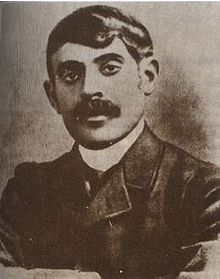Qāsim Amīn
Qāsim Amīn ( Arabic قاسم أمين) (* 1863 ; † 1908 ) was an Egyptian women's rights activist. His most famous works are "The Liberation of Women" ( Tahrir Al-Mar`ah - 1899) and "The New Woman" ( Al-Mar`ah Al-Jadidah - 1901).
life and work
Amin was a student of the famous Egyptian reform theologian Muhammad Abduh (1849-1905). He is considered an important Muslim feminist of his time. Qasim Amin was not the first to write about the emancipation of women from a liberal perspective, but he was the best known and most effective. He was preceded by the Algerian Muhammad ibn Mustafa ibn al-Khawga , whose book al-Iktirath fi huquq al-inath (“Respect for concern for the rights of women”) appeared in 1895, four years before Qasim Amin's “Liberation of women” and five years before his second book "The New Woman".
Oskar Rescher's German translation of “The Liberation of Woman” was published in 1992 by Echter Verlag (Würzburg) and Oros Verlag (Altenberge). Amin's liberal commitment was later continued by men like Ali Abd Ar-Raziq , who in his main work Al-Islam Wa Usul Al-Hukm ("Islam and the Basics of Rule" - 1925) mainly deals with the relationship between state and religion dealt with in Islam.
Leila Ahmed argues in her book Women and Gender in Islam that Qasim Amin can in no way be called feminist, as he essentially reflects the colonial view of the superiority of Western or British culture and wants to replace Muslim misogyny with Western / Victorian misogyny.
literature
- Charles C. Adams: Islam and Modernism in Egypt . 2nd edition, Russell & Russell, New York 1968, pp. 231-235.
- Qasim Amin: The Liberation of Women . Echter / Oros, Würzburg / Altenberge 1992.
Individual evidence
- ^ Leila Ahmed: Women and Gender in Islam. Historical Roots of a Moden Debate . Yale University Press, New Haven and London, 1992, Chapter 8: The Discourse of the Veil (pp. 144-168).
| personal data | |
|---|---|
| SURNAME | Amīn, Qāsim |
| BRIEF DESCRIPTION | Egyptian lawyer |
| DATE OF BIRTH | 1863 |
| DATE OF DEATH | 1908 |
